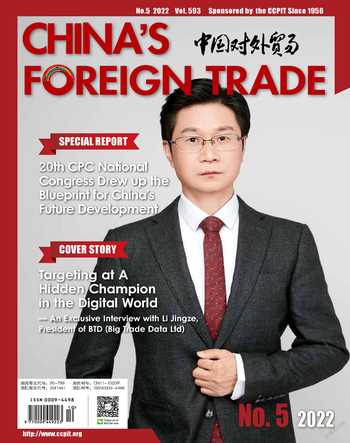The Pension Industry Calls for New Models and Ecology
By Lily Wang

Recent years have witnessed an increasingly aging Chinese population. According to the seventh national population census in 2021, the number of Chinese people aged 65 or above amounts to 190 million, accounting for 13.5% of the total population. China is marching towards a moderately severe aging condition at a higher speed. In the next five years, it is expected that the newlyadded aging population will amount to 23 million people, and the number of disabled elderly people will amount to 50 million.
Therefore, developing the pension industry is a key driving force for solving the issue of the aging population. This years CIFTIS set up a themed exhibition about the pension industry, shining the spotlight on the pension industry.
Finance empowering the pension industry
In April this year, the General Office of the State Council issued the Opinions on Promoting the Development of Personal Pensions, which established the framework for the personal pension system based on government policy support, voluntary participation of individuals and market-oriented operation; on May 10, the China Banking and Insurance Regulatory Commission issued the Notice on Regulating and Promoting the Development of Commercial Pension Financial Business, which provided clear support for banks and insurance companies to start engaging in the personal pension business, and stipulated the basic standards and principles for same. At the same time, various regions have also introduced relevant measures to develop pension finance and promote the reform of financial services to adapt to the aging population.
Li Yang, Deputy General Manager of Beijing Health Care Group, said that when the GDP per capita reaches USD 13,000 or above, the needs of the pension industry will increase sharply. The boom in the pension industry is characterized by the integration between industry and finance, with finance promoting the rapid development of the industry. Some institutions predict that by 2030, the pension industry scale will have reached RMB 22 trillion, while in 2020, the industry scale was just RMB 8 trillion. Therefore, the pension industry will replace the real estate industry as the new engine behind the Chinese economy.
Since the personal pension system was introduced, financial institutions have been itching to enter the market. In fact, the pension industry features large investments and a long recovery period, and requires financial institutions to innovate financial products and services and integrate them into the pension industry.

Guo Guanglei, Chairman of Beijing Life, said that when faced with the challenge of old-age security in the era of longevity, the financial industry should give play to its own advantages and scientifically integrate insurance, health and wealth management which are closely related to old-age care to meet the goal of combining medical care with nursing care and providing health services for the elderly in an affluent way.
Zeng Ying, Chief Supervisor of the Bank of Beijing, said that the Opinions on Promoting the Development of Personal Pensions clearly requires the participant to designate or open up his/ her unique account for their individual pension fund. Taking the Bank of Beijing as an example, the bank has 26 million individual customers in Beijing from whom it has collected capital amounting to RMB 950 billion. Among these individual customers, customers aged over 50 account for nearly 31%. The Bank of Beijing has been providing services for both the old and the young, as well as trade union card services, which has created a very solid customer base. Therefore, from a banking perspective, the Bank of Beijing has a natural advantage in terms of creating accounts. Furthermore, the bank has a very stable array of products, which can provide the elderly with longterm, more stable and safer services with moderate income earnings.
Huge demand for professional talent
Liu Yinling, professor of the Civil and Commercial Law Department of the School of Law of Zhongnan University of Economics and Law, said that China is facing a large population of the aged and the increasing aging of the whole population. Home-based care is still facing many difficulties, among which talent shortages represent the big bottleneck in access to homebased community care. She continued, saying that education and training for home-based elderly care services should be integrated into the large education system at a societal level. It is extremely important to carry out social management and establish a talent pool for social welfare.
Liu also said that according to the trend of Chinas population growth, the proportion of people aged 65 or above will surpass 15% in 2030 and 25% in 2050. Chinese society is quickly developing towards a super-aging society. About 90% of elderly people in China will stay at home to receive nursing care. The government, and community and nursing institutions extending care services for aged people at home and meeting their needs is an urgent issue. Home-based nursing services currently include four models, including the government-managed, agent-operated, government-funded and government purchased with market operation. Each model has its own advantages and disadvantages.
Liu Yinling again stated the fact that China is facing a larger population of elderly people, an increasingly aging population, an increasingly prominent empty-nest phenomenon, a rising oldage dependency ratio, an increased burden on elderly care, and the issue of becoming old before getting rich:“Chinese people normally tend to stay at home when they get old. According to relevant research, 90% of the elderly choose to stay at home for nursing care, and only about 10% of the elderly choose to live in institutions. However, at present, there are still shortcomings in providing nursing care for the elderly at home. In the future, there will be more and more elderly people living alone, and the demand for professional talent in elderly care services will continue to grow.”
Liu Yinling believes that the lack of talent is an important issue for elderly care in home communities. The key to the success of home-based elderly care service is to train an elderly care service team with excellent nursing skills, good qualities and great enthusiasm for the elderly. “In the training of home-based elderly care services, there should be a unified outline, teaching materials, an excellent faculty, and a number of social school institutions that have been recognized by relevant departments and received national, or at least provincial and municipal, qualification certificates. The purpose of this is to integrate the education and training of home-based elderly care services into the social education system, carry out socialized management, and establish a talent pool for social welfare.”
In addition, Liu also suggested that it is imperative to accelerate the training of service personnel in the fields of geriatrics, rehabilitation, nursing, nutrition and psychology, as well as talent in social work related to the elderly and the management of elderly care service institutions. At the same time, the income of elderly care practitioners should be largely increased, so that more people are willing to learn about elderly care and work in this industry.
Digital technology empowers health care for the elderly
As the aging of the population accelerates, helping elderly people fill the digital gap has become an urgent social issue.
Smart elderly care is able to tackle the problems of the high cost and low service quality of traditional models of elderly care, and has widely attracted attention throughout the industry. Li Bin, Assistant General Manager and Chief Technology Information Officer of Taikang Healthcare Investment, believes that “in terms of smart elderly care, ‘elderly care is the core and fundamental part, and ‘smart is only the supporting means.”
In the face of increasingly diversified pension needs and the pressure of high costs in elderly care, science and technology enterprises have been vigorously using information technology to make the elderly care service smarter and more adaptable to peoples needs. These enterprises integrate technology with traditional elderly care at home, in community or institutions, and allow the technology to improve the quality and efficiency of the health pension industry.
Liu Junwei, General Manager of Baidu Smart Healthcare, said that Baidu focuses on the actual needs of the elderly, and uses AI technology and hardware to create an intelligent and elderly-oriented service concept, so that elderly people can be “medicated”, “cared for” and feel happy. The technology not only brings convenience and efficiency, but also provides emotional care.
Hisense AiLife has built a wholeprocess home health system including perception, computing and service providing. Their solutions cover all Hisense product categories, including smart home appliances, smart home products and a variety of monitoring devices; through comprehensive platform capabilities such as data transmission, data processing, AI computing, etc., these solutions also provide services for elderly-oriented scenarios such as health management, health consulting, healthy diets, healthy sleep schedules, safety protection, etc.
Zhu Yan, President of the Institute of Internet Industry of Tsinghua University, highlighted the idea that with the wide application of digital technology, especially trusted computing technologies in the health care industry, problems such as the lack of data and poor data credibility in the industry will be gradually solved. As more and more enterprises participate in technological innovation and model innovation, health care data will turn into assets across the industry.
- China’s foreign Trade的其它文章
- The Development of Foreign Trade in China over Last Decade:Higher-level Opening-up to the Outside World
- New Changes in Travel:Past Visitors Are Become Today’s Experiencers
- China’s Livestreaming Enters A New Phase of Development
- Digital Technology Promotes China-foreign Trade in Agricultural Services
- As Shipping Costs“Dive”,It Is Imperative to Improve the Layout of Industrial Chain
- China Manufacture“Prepares”for World Cup

